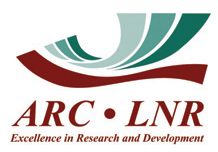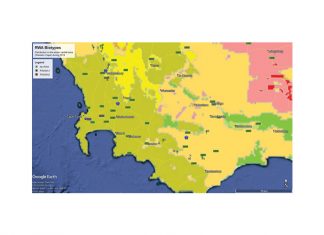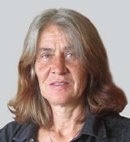
ARC-Small Grain,
Bethlehem
Russian wheat aphid (RWA) is an international pest on wheat and occurs in most countries where large-scale wheat cultivation is practiced. Consequently, considerable efforts have been made to manage RWA globally. The two management options used currently are chemical control and breeding for deployment of resistant wheat cultivars.
Management practices
There are, however, drawbacks to both of these management practices. Chemical control has a negative impact on the environment, especially on other insect groups such as predators, pollinators and decomposers. The active ingredients registered for the control of RWA on wheat are limited and include acetamiprid, chlorpyrifos, chlorpyrifos + cypermethrin, demeton-S-methyl, dimethoate, imidacloprid, parathion, prothiofos and thiamethoxam. With widespread and continuous use, there is the possibility that RWA can build up resistance against these specific active ingredients.
The drawback with resistance breeding is that certain RWA populations can overcome the resistance in the wheat, resulting in new biotypes virulent to the resistant wheat cultivars. Since 2005, four ‘new’ RWA biotypes have been recorded in the wheat production areas of the eastern Free State: RWASA2 in 2005; RWASA3 in 2009; RWASA4 in 2011 and RWASA5 in 2018.
RWA biotype distribution
During the 2018 season the new RWA biotype, RWASA5, was recorded on eight wheat fields in the Lindley, Reitz and Daniëlsrus areas in the eastern Free State (Figure 1). During 2019 this biotype had increased and spread, and was recorded on twelve wheat fields in the eastern Free State (Figure 2). RWASA2 was recorded on two fields, RWASA3 on four fields and RWASA4 on two fields (Figure 2).
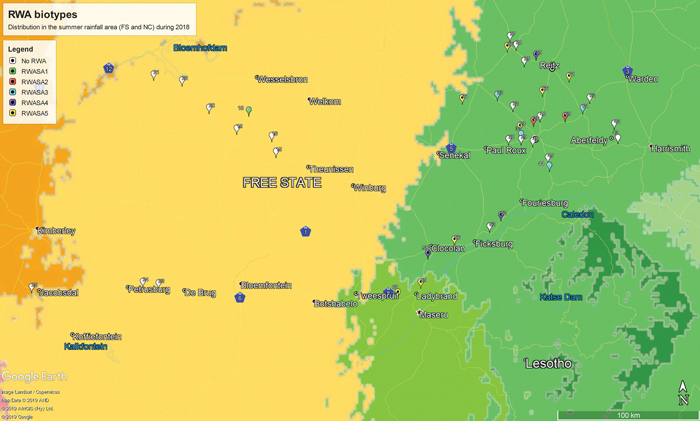
The concentration of RWA biotypes occurred only in the eastern Free State, with very few wheat fields infested with RWASA1 (original biotype, reported in 1978) in the western Free State and Northern Cape (Figure 2).
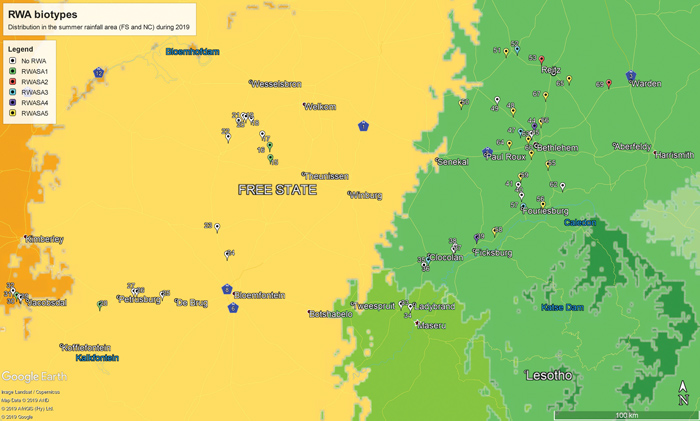
In 2019 RWASA1 was widespread in both the Swartland and Rûens areas of the Western Cape, with only two fields not infested with this biotype and one field infested with RWASA2 (Figure 3). The fact that RWASA1 was widespread in the Western Cape and that in some cases live populations were collected in fields recently sprayed with pesticides, may indicate pesticide resistance. These observations reflect the different management practices in the different areas. In the dryland summer rainfall regions (mainly the eastern Free State), resistant wheat cultivars were relied on to manage RWA, while in the Western Cape, chemical control was relied on as a general aphid management tool.
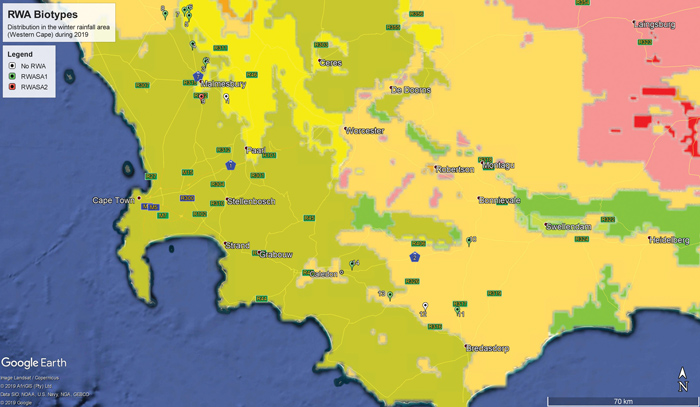
Change of cultivation practices
Both management practices in different regions seem to cause increased virulence in RWA populations. To prevent the further increase and spread of more virulent RWA populations, cultivation practices need to be changed.
By increasing the diversity of crops with intensive crop rotation, intercropping, companion planting as well as cover cropping, the diversity of other insects that contribute valuable ecosystem services such as predation, will increase and the continuous incidence of host plants suitable for RWA will decrease. With these cultivation practices the increase of RWA populations can be limited and kept under the economic damage threshold. Also consider increasing the diversity within a crop by not planting wheat with the same genetic background in large areas every year. Pesticide resistance can be limited by only using pesticides when absolutely necessary and if doing so, alternating among the various active ingredients. In this regard, monitoring of fields is important so that problems can be addressed as they occur.
Contact Dr Astrid Jankielsohn at ARC-Small Grain at 058 307 3431; 082 564 3795 or at jankielsohna@arc.agric.za with any queries.